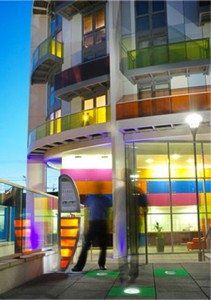
Recycled rubber paving slabs from PaveGen are set to help power Europe’s largest urban mall at the 2012 London Olympics site. The paving slabs harvest the kinetic energy that occur when people step on them, and converts it into electricity. This will be PaveGen first commercial application, where 20 tiles will be placed along the central crossing between London’s Olympic stadium and the recently opened Westfield Stratford City mall. The mall expects an estimated 30 million visitors in its first year.
“That should be enough feet to power about half its (the mall’s) outdoor lighting needs” said Laurence Kemball-Cook, the 25-year-old engineering graduate who developed the prototype during his final year of university in 2009.
Although each step produces only enough electricity to keep an average LED-powered street lamp lit for 30 seconds, the power generating tiles are a great example of a real-world crowdsourcing application, harnessing small contributions from a large number of individuals. “We recently came back from a big outdoor festival where we got over 250,000 footsteps and that was enough to charge 10,000 mobile phones” said Kemball-Cook.
The invention can potentially be used to power off-grid appliances such as public lighting, advertising and illuminated street crossings. Ideally it would be applied in dense populated areas such as city centers, underground stations and school corridors where it would harvest the most power on a daily basis. The rubber slab is easy to retrofit on existing pavements, an can be made to match the exact dimensions needed. Looking to the future, Kemball-Cook would like to see the paving system introduced to the developing world. In areas that have a high footfall, but are off-grid, such as the slums in Mumbai, this implantation could really make a difference in peoples life’s.
Kemball-Cook is confident that the slab is durable, and over the course of a month his creation has been tested with a machine that replicates the pounding of footsteps, non-stop every day. Although generally enthusiastic and confident about the product, Richard Miller, head of sustainability at the UK’s government-funded Technology Strategy Board, withholds speculation about its far-reaching impact. “As with all things of this nature, on a large scale and in the long term, its success will be determined by how cost-effective it is to produce … If it turns out to be expensive, then it will struggle to find a place as anything more than a niche application” he said.
The company has already won numerous of awards, including the Big Idea category at the UK’s Ethical Business Awards and the Shell LiveWire Grand Ideas Award. PaveGen has also received an angel investment from London Business Angels (LBA)
